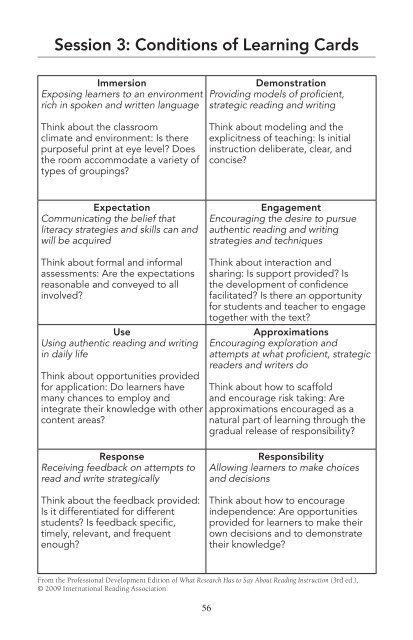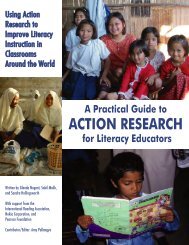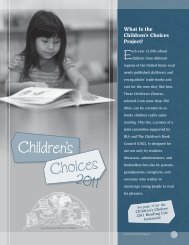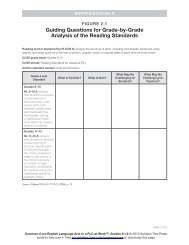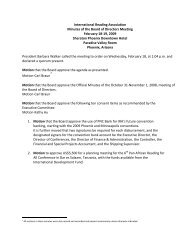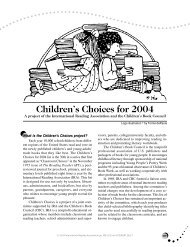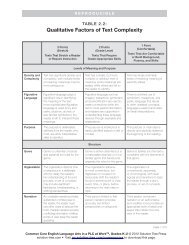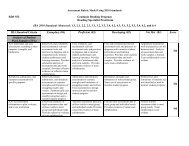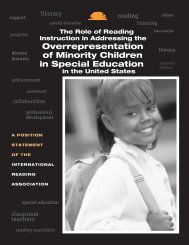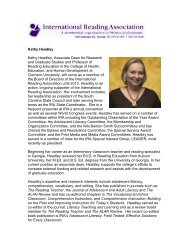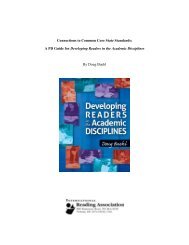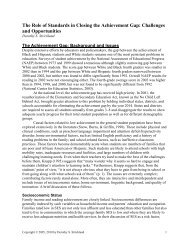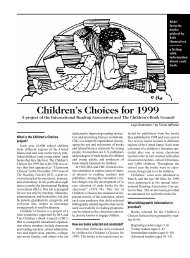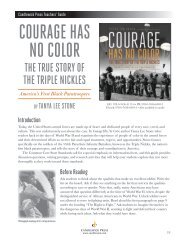What Research Has to Say About Reading Instruction - International ...
What Research Has to Say About Reading Instruction - International ...
What Research Has to Say About Reading Instruction - International ...
Create successful ePaper yourself
Turn your PDF publications into a flip-book with our unique Google optimized e-Paper software.
Session 3: Conditions of Learning Cards<br />
Immersion<br />
Exposing learners <strong>to</strong> an environment<br />
rich in spoken and written language<br />
Demonstration<br />
Providing models of proficient,<br />
strategic reading and writing<br />
Think about the classroom<br />
climate and environment: Is there<br />
purposeful print at eye level? Does<br />
the room accommodate a variety of<br />
types of groupings?<br />
Think about modeling and the<br />
explicitness of teaching: Is initial<br />
instruction deliberate, clear, and<br />
concise?<br />
Expectation<br />
Communicating the belief that<br />
literacy strategies and skills can and<br />
will be acquired<br />
Engagement<br />
Encouraging the desire <strong>to</strong> pursue<br />
authentic reading and writing<br />
strategies and techniques<br />
Think about formal and informal<br />
assessments: Are the expectations<br />
reasonable and conveyed <strong>to</strong> all<br />
involved?<br />
Use<br />
Using authentic reading and writing<br />
in daily life<br />
Think about opportunities provided<br />
for application: Do learners have<br />
many chances <strong>to</strong> employ and<br />
integrate their knowledge with other<br />
content areas?<br />
Think about interaction and<br />
sharing: Is support provided? Is<br />
the development of confidence<br />
facilitated? Is there an opportunity<br />
for students and teacher <strong>to</strong> engage<br />
<strong>to</strong>gether with the text?<br />
Approximations<br />
Encouraging exploration and<br />
attempts at what proficient, strategic<br />
readers and writers do<br />
Think about how <strong>to</strong> scaffold<br />
and encourage risk taking: Are<br />
approximations encouraged as a<br />
natural part of learning through the<br />
gradual release of responsibility?<br />
Response<br />
Receiving feedback on attempts <strong>to</strong><br />
read and write strategically<br />
Think about the feedback provided:<br />
Is it differentiated for different<br />
students? Is feedback specific,<br />
timely, relevant, and frequent<br />
enough?<br />
Responsibility<br />
Allowing learners <strong>to</strong> make choices<br />
and decisions<br />
Think about how <strong>to</strong> encourage<br />
independence: Are opportunities<br />
provided for learners <strong>to</strong> make their<br />
own decisions and <strong>to</strong> demonstrate<br />
their knowledge?<br />
From the Professional Development Edition of <strong>What</strong> <strong>Research</strong> <strong>Has</strong> <strong>to</strong> <strong>Say</strong> <strong>About</strong> <strong>Reading</strong> <strong>Instruction</strong> (3rd ed.),<br />
© 2009 <strong>International</strong> <strong>Reading</strong> Association.<br />
56


